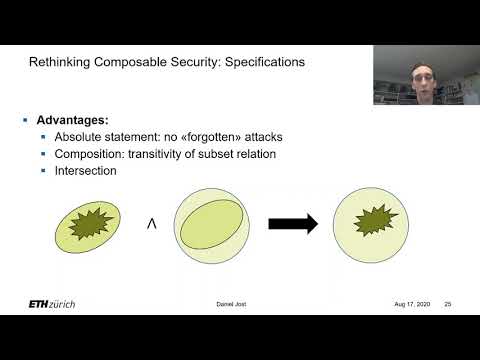Welcome to the resource topic for 2020/092
Title:
Overcoming Impossibility Results in Composable Security using Interval-Wise Guarantees
Authors: Daniel Jost, Ueli Maurer
Abstract:Composable security definitions, at times called simulation-based definitions, provide strong security guarantees that hold in any context. However, they are also met with some skepticism due to many impossibility results; goals such as commitments and zero-knowledge that are achievable in a stand-alone sense were shown to be unachievable composably (without a setup) since provably no efficient simulator exists. In particular, in the context of adaptive security, the so-called “simulator commitment problem” arises: once a party gets corrupted, an efficient simulator is unable to be consistent with its pre-corruption outputs. A natural question is whether such impossibility results are unavoidable or only artifacts of frameworks being too restrictive. In this work, we propose a novel type of composable security statement that evades the commitment problem. Our new type is able to express the composable guarantees of schemes that previously did not have a clear composable understanding. To this end, we leverage the concept of system specifications in the Constructive Cryptography framework, capturing the conjunction of several interval-wise guarantees, each specifying the guarantees between two events. We develop the required theory and present the corresponding new composition theorem. We present three applications of our theory. First, we show in the context of symmetric encryption with adaptive corruption how our notion naturally captures the expected confidentiality guarantee—the messages remain confidential until either party gets corrupted—and that it can be achieved by any standard semantically secure scheme (negating the need for non-committing encryption). Second, we present a composable formalization of (so far only known to be standalone secure) commitment protocols, which is instantiable without a trusted setup like a CRS. We show it to be sufficient for being used in coin tossing over the telephone, one of the early intuitive applications of commitments. Third, we reexamine a result by Hofheinz, Matt, and Maurer [Asiacrypt’15] implying that IND-ID-CPA security is not the right notion for identity-based encryption, unmasking this claim as an unnecessary framework artifact.
ePrint: https://eprint.iacr.org/2020/092
Talk: https://www.youtube.com/watch?v=WmmV9nCtMFI
Slides: https://iacr.org/submit/files/slides/2020/crypto/crypto2020/139/slides.pdf
See all topics related to this paper.
Feel free to post resources that are related to this paper below.
Example resources include: implementations, explanation materials, talks, slides, links to previous discussions on other websites.
For more information, see the rules for Resource Topics .
